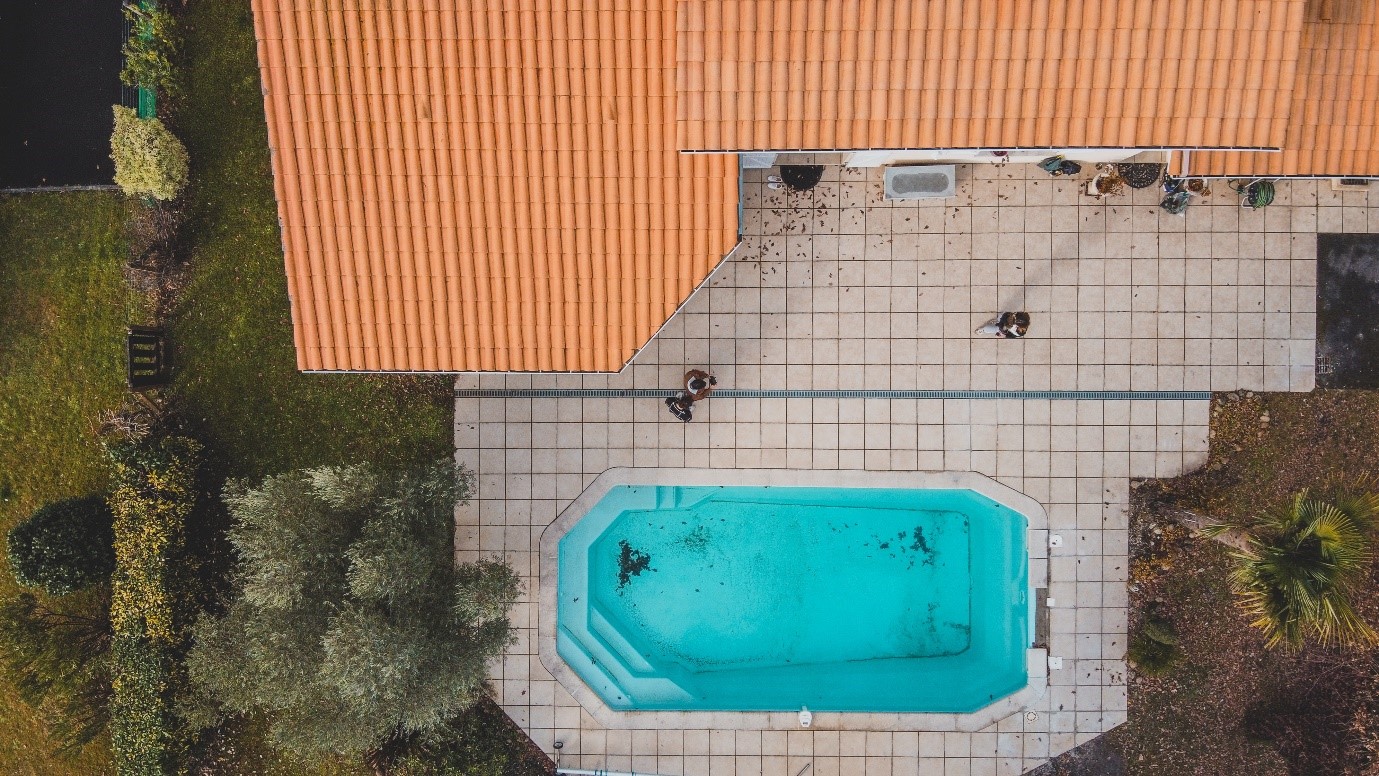Now you have taken the time to perfectly plan and lay your new patio, you’ll need to know how to keep it clean, so it looks good as new for years to come
Most paved areas will need to be cleaned in two ways to account for the different sections of a domestic patio- the paved area and the stone or tile of your choosing.
Improper cleaning can result in etched stone surfaces with visible damage, discoloured stone, and a vastly shortened lifespan.
Here are our top tips on how to clean your patio to maintain its condition.
Caring for the paving
To keep your patio looking its best, there are a few simple things you can do. These tasks shouldn’t take you much time but will have a lasting impact on your outdoor space.
Regular brushing
Keeping the area clear of dirt and debris is essential for stopping build-ups and stains from appearing.
It will also help to stop weeds and other plants from germinating and taking root on the surface of the stones or between them in the mortar joints.
Refill joints
Joints are crucial for structure and keep your paved area as one complete construction.
If you allow for cracks in the joints, you are quite literally paving the way for weeds to grow through, ruining the effect of your beautiful patio.
Regularly removing any weeds that grow through, brushing gently along the joints with a stiff-bristled brush and rinsing to remove accumulated debris will help ensure your joints are strong and free from damage.
Seal paving stones
Depending on your paving stone, it may need to be resealed every few years.
This should always be done with stone-specific sealants and applied according to the manufacturer’s instructions. This ensures the longevity of the stones and will increase the lifespan of your patio.
Caring for the tile or stone
Tile and stone maintenance will differ home by home, depending on the stone you chose when designing your paved area.
This will also determine if you can use a jet washer to clean your patio. While popular with homeowners, jet washers can place undue pressure on some paving stones and can cause damage, so should only be used if appropriate.
Read on to see how you should properly clean your stone of choice.
Porcelain
Porcelain tiles are a famously low-maintenance option, so you don’t have to worry about hours of cleaning.
Simply wash your tiles 2-3 times per year with a brush and warm soapy water, rinse, and leave to dry.
While it’s safe to use a jet washer on porcelain tiles, it won’t be necessary if your tiles are maintained regularly.
Sandstone
Sandstone is warmly coloured and naturally textured, making it a popular choice for many homes.
If you wash your patio regularly, you will only need warm soapy water to clean it. If the stone has become stained from algae or moss, you can use a bleach mixture, made from equal parts bleach and water.
Simply apply the soapy water or bleach mixture, leave it to stand for 30-minutes, and scrub with a stiff brush or jet washer, rinsing well to ensure all bleach is removed.
If you choose to use a jet washer, make sure it’s on a gentler setting to prevent damaging the joints in the paved area.
Granite
Due to its durability, granite is a sensible choice for the garden.
As such, it is very easy to clean and maintain. Simply wash your tiles a couple of times a year with a brush and warm soapy water, rinse, and leave to dry.
Similar to sandstone tiles, you can use a jet washer, but it can damage the surface of the stone if applied harshly, so it is considered best practice to use a very gentle setting or just use a brush if you want to be extra safe.
Slate
Slate is a common and traditional option for paving.
Acidic cleaners can be very damaging to the surface of the slate, so it is best to ensure that you use neutral or alkaline cleaners on your slate patio.
As such, warm soapy water is perfect for cleaning your paved area.
Simply add a few drops of dish detergent to warm water, soak the patio in the soapy water, and use a stiff brush to remove dirt and grime.
It is important that you remove any lingering soap by rinsing your slate before leaving it to dry.
Limestone
A great insulator with a pleasant texture underfoot, limestone is great for domestic patios.
To keep your limestone looking fresh, dilute a few drops of non-acidic cleaner in a bucket of warm water and apply to your stone with a mop.
After leaving it to absorb for 45- minutes, you can gently scrub with a soft brush or mop, rinse, and then leave it to dry.
Marble
Marble has long been associated with luxury and elegance, enhancing any garden.
Cleaning marble patios is very simple too, and only needs a gentle wipe-down with warm water and a mild, non-abrasive cleaner, such as dish detergent. You should rinse the stones after and then they can be left to dry.
Harsh, abrasive cleaners and jet washers will scratch and damage the stone, so should be completely avoided when it comes to marble patios.
Get in touch for patio cleaning tips
Regular cleaning will ensure that your patio is safe, strong, and enjoyable to use for decades to come.
However, just like regular servicing for your car, if neglected and overlooked, your patio could become unsafe, damaged, and turn your garden into a real eyesore.
For more information on how to care for your paving stones, contact the experts here at Stone and Porcelain by calling 01744 304 545 or by filling in our quick enquiry form and we’ll get back to you as soon as we can.

